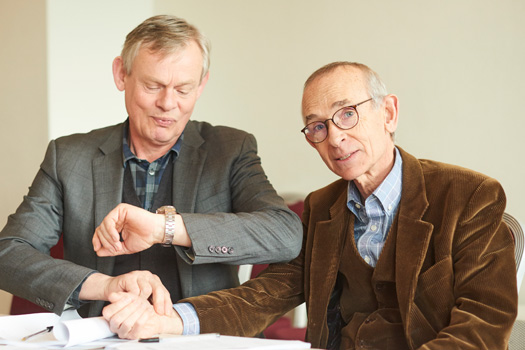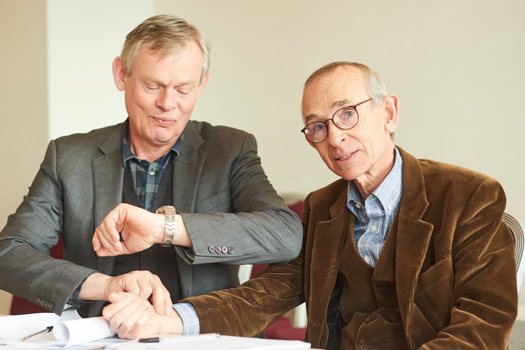Working life: Creating GP drama

Profile: Dr Martin Scurr

Roles: Medical adviser for TV dramas including Doc Martin. Various media doctor roles. Formerly full-time GP partner at a private London practice
Hours worked: Around eight hours on Doc Martin and writing a newspaper column each week, previously fitted in around 12-hour days at the practice
January 2016
Production on the next series begins with a roundtable discussion involving four writers, two directors, the producer, two script editors and me. Each series is a two-year process, writing in the first year and filming in the second.
Between us we sketch out eight episodes. Within weeks, scriptwriters are sending me ideas based on medical scenarios I’ve suggested as well as their own experiences and research.
I’ve been involved in every series since writer and friend Dominic Minghella approached me in 2004 to help write the first six episodes. Every medical event in that first series replicated experiences from my practice – I had a ready stock of ideas from my 25 years as a GP in Notting Hill, west London. I didn’t anticipate then just how much time I would spend over the following decade helping to invent, refine and polish scripts.
March 2016
From now until the end of summer, I spend eight hours a week reviewing scripts, advising, revising and predicting any problems that might arise in filming. I’m in daily contact with the writers by email, and we have telephone discussions two or three times each week (in secrecy). This was challenging when I was working full time, squeezing calls in during a lunch break. Now I have retired I am able to give it more attention.
Finding ideas has become more pressing over recent series – the main character and his wife have settled down, meaning less tension comes from their relationship so the writers draw on the medical drama. One spin-off for me professionally has been that this has meant scrutinising journals ever more closely; I am now more widely read than ever.
October 2016
ITV executives go through the script with the compliance unit to check everything portrayed is genuine and realistic. We do, however, have to avoid medical scenarios that may make viewers over-anxious, and illnesses such as cancer or degenerative neurological disease. This rather limits our options for portraying the real life of a GP – not to mention the grouchy, confrontational personality of the fictional doctor.
February 2017
We meet the actors for the read-through. I make notes of procedures I need to teach Martin Clunes, who plays the lead role. Martin is a star student. I only have to show him a technique once – whether suturing a wound, using an ophthalmoscope, examining an abdomen or obtaining an ECG. I list any prosthetics or special make-up that might be needed, and record drug names and medical terms as voice files to help the actors practise pronouncing them.
March 2017
Filming begins. The crew of more than 70 technicians and actors migrates to Cornwall for five months. I stay in contact as the scripts are continuously revised. Often the script editor will ask me to think of a short intervention that the doc can be doing for, say, 60 or 80 seconds, such as hooking a bead out of the nose of a toddler or removing a foreign body from an eye. I keep an updated list of options, as we must never use anything twice. Unlike real GP work there are no repetitive respiratory infections, consultations about fatigue or mood disorders. I also brief the make-up technicians on prosthetics.
Sometimes I’m asked to attend filming for certain scenes, to advise the director. This year I travelled down to Cornwall on ten occasions. Going on-set can be exhausting, demanding and subject to a fair degree of consultation and debate, trying to balance the needs of television art and realism. However, it has made for a refreshing change from working at the coal-face over the years.
The crew sends me rough edits as soon as they are filmed, which I review, hoping no re-filming will be needed. Mostly this means highlighting a mispronounced technical phrase, which can then be re-dubbed.
September 2017
The series is aired over the next three months, gaining good reviews and viewing figures. Inevitably we get a few complaints from the public and medical colleagues who see something that looks unrealistic or implausible. Things can go wrong in filming; in this series we filmed Doc Martin fashioning an emergency underwater chest drain to treat someone who has suffered a sudden pneumothorax while out walking along a high clifftop path. The scene was filmed in a raw biting wind and we got to the part where the needle was to be inserted with only an hour or so of daylight left; I could see straight away that the prosthetic had been placed too low, but there was no time for the technicians to start again. The camera only revealed it for a second or two but sure enough we had complaints from hospital doctors accusing the medical advisor of incompetence – and proffering their skills for the next series!
Despite the odd setback, the work is incredibly rewarding and provided me with a release from the intense practice of non-NHS primary care in central London. The opportunity to stand back and examine the life and work of a GP in creating a fictional portrayal has also proved helpful psychologically over the past 13 years, allowing me to take an objective look at what we do and how.
Pulse July survey
Take our July 2025 survey to potentially win £1.000 worth of tokens











